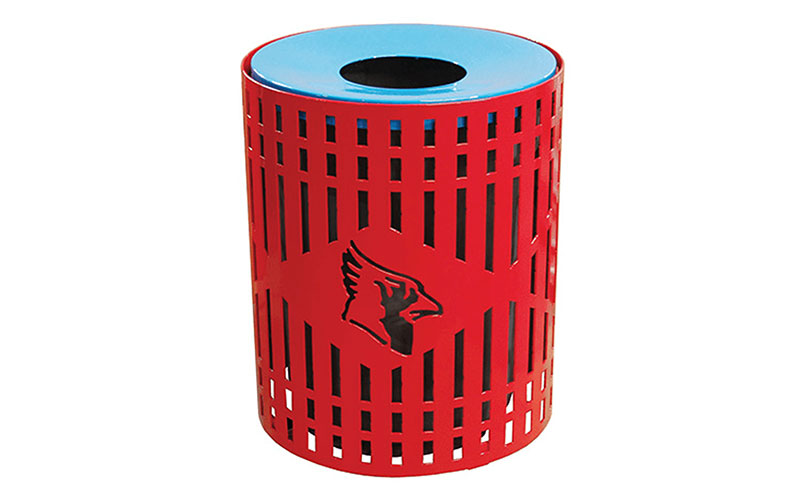We bet you didn’t think commercial receptacles could be interesting, but think again! Placement of trashcans and recycling bins, as well as how many are readily available, make a big difference to how much litter is found around your property. As well as how well visitors and employees recycle.
While the focus on recycling has largely been on curbside and residential recycling, promoting better recycling practices in the workplace could make a major difference. Adequate receptacles help reduce litter and improve recycling practices no matter if you operate an apartment complex, golf course, or business of any type. After all, according to the Environmental Protection Agency (EPA), around 45% of municipal solid waste is produced in workplace settings.
Desk-Side Recycling Bins Can Improve Recycling By 20%
A “Recycling at Work” test funded by Keep America Beautiful, and with support from CBRE and PepsiCo Recycling, involved assessing offices in Atlanta, Houston, Boston, and San Diego. The study was conducted over a six-month period in 2014. The goal was to identify best practices to promote recycling in the workplace.
Participants were broken up into four different test groups:
- The “Equal Size” group of employees were each given one recycling bin and one trash bin—a common set up in offices.
- The “Recycling Only” group was given a recycling-only can, but no trash bin.
- The “Little Trash” group was given a desk-sized recycling bin as well as a smaller hanging trash bin.
- And lastly, the Control Group was given information about recycling but nothing about their office set up changed regarding commercial receptacle availability.
Each group was given a flyer detailing information about the most common items found in office recycling bins and trash cans. Additionally, all recycling cans were labeled with a logo and the most common recyclable items (aluminum cans, plastic bottles, and office paper). Trash cans were marked with a landfill logo.
Test findings were compared with audits performed prior to the test to see how employees threw away trash and recycled prior to changes being implemented.
The Results of the Study
The “little trash” group showed around 20% improvements in the quality of materials collected in recycling bins. This group also showed improvements in their overall knowledge about recycling. By giving employees small trash cans and regular-sized recycling bins, it was clear that way more stuff was ending up in recycling, while the amount of trash produced decreased—this was especially true regarding office paper. There was also a decrease in recyclables placed in the trash bin. No paper was found in the trash bin. All in all, participants in the “little trash” group reported a positive experience.
The “equal size” group did not find any considerable differences in recycling behavior. While recycling bins collected more recyclables and fewer trash items, there were the same number of recyclables in the trash.
The “recycling only” group was not as fond of the experience, going into it and throughout the study. In fact, four offices dropped out of the project because they said participation caused “throwing recyclables in the trash that would have ended up in the recycling bin prior to the project,” said Brenda Pulley, the senior VP of recycling for Keep America Beautiful.
While researchers went into the study knowing that convenience matters in getting people to properly throw away trash and recycle, they were surprised by the results of the study. The takeaway? More education and signage for recycling needs to be implemented. Researchers also recommend putting more focus on certain items that should be high priority for every office recycling program. These items include:
- Office paper—although the most frequently recycled material in offices, it is still found in 50% of office trashcans.
- Plastic and aluminum beverage bottles/cans—these items are found nearly equally in recycling bins and trash bins, but should always end up in recycling.
- Paper towels—commonly found misplaced in recycling, although with education the number of paper towels in recycling bins decreased over the course of the study.
- Food scraps—these also showed up in recycling bins too often, but not with as much frequency as paper towels.
How to Make Your Office or Business More Eco-Friendly
There are some things you can do to make your business better at properly discarding trash and recycling materials.
- Label recycling bins with graphics depicting commonly recycled items.
- Hand out flyers and maintain educational practices to inform employees and patrons of best recycling practices.
- Provide more opportunities to recycle, as well as adequate trash receptacles.
Custom Commercial Receptacles
At TerraCast Products, we produce long lasting commercial receptacles that can be customized with graphics, logos, and unique colors. Our products are made right here in the USA using high quality and carefully sourced materials, as well as sustainable practices. Dark products can be made from nearly 100% post-consumer recycled materials, and all receptacles are recyclable. Our goal is to help you better the environment. Together we can accomplish your business recycling goals!

